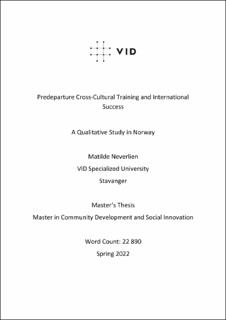| dc.description.abstract | This thesis looks into the realms of predeparture cross-cultural training and international
success. The focus group is on professionals, or expatriates, who are travelling abroad for
the purpose of work. International success has, in this thesis, been connected to the entities
of cultural intelligence, training transfer, and sustainable development. The research
question goes as follows: ͞How does predeparture cross-cultural training impact
international success͍͟. In order to answer the problem statement, two organizations have
been subjected to research. Norec and Hald International School have been chosen as case
studies for the purpose of exploring the research question in a Norwegian context. The
primary focus is on the components of predeparture cross-cultural training programs; their
ability to generate cultural intelligence; their ability to transmit this information; and the
potential for improving job performance and sustainable development.
The data was collected through documents, texts, and interviews of four key
informants within the two organizations. Organizational documents, as well as course plans,
were examined. In order to generate results, thematic analysis was chosen as the primary
methodology. In order to provide personal insight on the subject, interviews were chosen as
secondary data collection. Three theories were incorporated into this thesis: (1) cultural
intelligence, (2) training transfer, and (3) sustainable development. These were compared to
literature on the subject of cross-cultural training and investigated further in light of the
findings.
The findings indicate a connection between predeparture cross-cultural training and
enhanced job performance. The preconditions, or possibility, for international success were
found to be present within the two organizations’ preparatory courses. These included
individual learning of skills and knowledge, and the possibility of using these in practice
during and after the exchange. This is seen in connection with micro, meso, and macro
levels, whereas individual learning can be transcribed into practice at the receiving and
sending organizations and have an impact on society at large. The findings of this thesis have
ramifications for future study, particularly in terms of establishing a link between
predeparture cross-cultural training and sustainable development | en_US |

